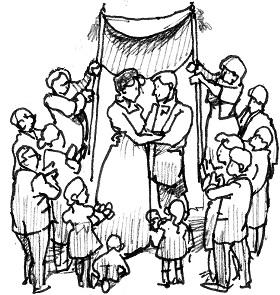

“They are no longer two, but one flesh” (Matthew 19:6).
Josh 24:1-13; Matt 19:3-12
The great narrative of salvation history is repeated often in both the first and second Testaments. God called Abraham, Isaac and Jacob, whose son Joseph brought the family down into Egypt during a famine. Centuries later, Moses led the Hebrews out of Egypt again, and during their long sojourn in the desert initiated them into the Covenant and the Law that made them God’s Chosen People. Under Joshua, they entered the land of Canaan.
Jesus knew the Scriptures and these same patriarchal and liberation narratives, including the words of the prophets, the glorious reign of David and the fall of the kingdom, the exile of God’s people in Babylon, their return to their homeland with the promise of a messiah. Readers of the Bible benefit from knowing this narrative as the historical framework on which to hang what often seem like random events and multiple genres of literature: history, poetry, prayers and prophecy.
Despite charges that he was a heretic and a law breaker, it seems clear that Jesus carefully guarded the core commandment of love at the heart of the Scriptures. His defense of marriage in today’s Gospel shows this. Jesus rejects Moses’ concession allowing husbands to divorce their wives as contrary to the Creator’s original intent that the bond between husband and wife is indissoluble because it mirrors God’s nuptial covenant with Israel. Two become “one flesh,” a new creation, when they unite their lives in love and fidelity. No “writ of dismissal” from a dissatisfied husband can break this bond. Moses allowed it only because of “the hardness of your hearts.”
Separation, divorce and remarriage, annulments, trial unions and same-sex marriages are cultural realities, and pastoral care of all couples is challenged to help them while protecting the ideals proposed by Genesis and Jesus. At the end of today’s Gospel, Jesus acknowledges the difficulties and the grace required to make love the guiding principle of our lives, whether we marry or not. Jesus rejected both the laxity and the harsh legalism of the Pharisees, who tried to trap him in the dilemmas love creates for everyone who risks it.
But risk love we must if we want to be fully human and to know and love God, the deepest mystery of all. The Scriptures eventually lead us to this mystery if we make the great narrative the road we travel to find God in our human experience, especially our failures and struggles in the name of love.
Advertisement






